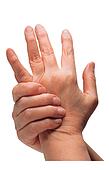Arthritis—a crippling and deteriorating disease that can affect almost any joint on the body. For most people arthritis is a medical term, but for more than 40 million people in the United States it is a painful reality.
Just as there are many different categories of certain diseases, such as cancer, arthritis is a general term for several different types of arthritis. According to Arthritis Today, there are over 100 types of arthritis conditions. The most common conditions are: rheumatoid arthritis, osteoarthritis, juvenile arthritis, psoriatic arthritis, gout, osteoporosis, and fibromyalgia.
These seven different types of arthritis are the most common types of arthritis, but what is probably not so common is a person suffering from four different types of arthritis. This is exactly what Judy Rase deals with on a daily basis. Judy has suffered from psoriatic arthritis between 6 and 7 years, but before that she also suffered from fibromyalgia, osteoporosis, and rheumatoid arthritis. Today, Judy’s psoriatic arthritis is more pronounced. With psoriasis patches located on her hands, wrists, legs, and hair, and several joints affected by this disease Judy has some good days and bad days.
Arthritis Today describes psoriatic arthritis as an auto immune disease that inflames the bodies’ joints and causes pain, swelling, and damage. In most cases this disease occurs in people who have psoriasis. What causes psoriatic arthritis is that the body begins recognizing healthy tissue as foreign antibodies and sends white cells to attack the tissue that lines the joint capsule, thus resulting in swollen joints.
With swollen joints come stiffness and pain and the need of relief. But the source of relief is different for each patient. For Judy, finding the medication that fit her needs was a trial and err process. “I was put on Methotrexate, but had to come off of that because my liver count went up. I was then put on a medication called Celebrex, but ended up not being able to use that either because of my high blood pressure. I am now on an I.V. medication called Remicade that I take every eight weeks,” Judy said. This appears to be working well for her.
But these medications do not work for everyone, including 21 year old JP Hartline. JP Hartline’s symptoms began when he was 11 years old. With blood tests and doctor’s visits JP found out that he had what is called HLA-B27 which is a gene malfunction, but also acts a lot like rheumatoid arthritis and is treated like it as well. Every three years, Hartline would have a flare up and with each flare up his medication would be changed. He was first prescribed to be on Naperson, when that did not work he was put on Embril, which worked well. Thankfully, JP is now able to function without the assistance of any arthritis medicine, and when he does have a flare up he is able ease the pain with Tylenol arthritis. But JP still has limitations. He is not able to stand for long periods of times and is not able to engage in any physical activity. “It’s hard for a person to understand because outwardly it looks like nothing is wrong and it’s hard to explain to people. I also get weird looks because people think that arthritis is an old person’s disease,” JP said. And this is not always the case.
 But aside from medication what else can people do, who suffer from arthritis to help ease their symptoms? According to Helen Matthews, a nurse who works for the national institute of health, diet and exercise is a key. In fact, Helen explains that it could even reduce inflammation. Helen ends by saying that people without arthritis should be thankful. “Anyone without arthritis should value their mobility, because arthritis is a crippling disease,” Matthews said. For more information about the different types of arthritis visit http://www.arthritistoday.org/
But aside from medication what else can people do, who suffer from arthritis to help ease their symptoms? According to Helen Matthews, a nurse who works for the national institute of health, diet and exercise is a key. In fact, Helen explains that it could even reduce inflammation. Helen ends by saying that people without arthritis should be thankful. “Anyone without arthritis should value their mobility, because arthritis is a crippling disease,” Matthews said. For more information about the different types of arthritis visit http://www.arthritistoday.org/